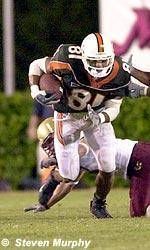
Miami Perfecting Use Of Tight End
Nov 7, 2002
By MARK LONG
AP Sports Writer
CORAL GABLES, Fla. (AP) – When Rob Chudzinski draws up plays for No. 1 Miami, he’s always thinking about the tight end.
No matter the down or the distance, whether it’s a run or a pass, the tightend is an integral part of Chudzinski’s offense – and Miami’s success.
While many programs are turning to wide-open offenses that feature up tofive receivers, the Hurricanes (8-0) are using the tight end to perfection -creating mismatches for defenses and a pipeline to the NFL.
“We’ve tried to make the tight end position lethal, in the passing game andthe running game,” said Chudzinski, who played tight end for the Hurricanesfrom 1986 to 1990. “We’ve had some pretty special guys, but I think we do agood job of utilizing them and taking advantage of those mismatches.
“You really have to look to try to do it. It’s not something where you sayyou want to throw to the tight end. You have to find ways of doing it andmaking it work.”
Talent helps, too.
Miami had Bubba Franks in 1999, Jeremy Shockey last season and now KellenWinslow Jr. – the son of Hall of Fame tight end and San Diego Chargers greatKellen Winslow.
“I want to be a big-time tight end,” Winslow Jr. said. “I want to be likeShockey or my dad. Both of them. I just have to be patient and it will come.”
Maybe soon. Winslow has a team-high 32 catches for 409 yards and fivetouchdowns entering Saturday’s game at Tennessee (5-3).
“I’m impressed with Winslow,” Volunteers coach Phillip Fulmer said. “He’sjust a really good player. He’s a wide receiver playing tight end who’s also areally good blocker. We’ll have to really work to find a way to scheme aroundhim and get some help on him.”
The Vols also have a good tight end: Jason Witten, who has a team-high 29catches for 357 yards and four touchdowns, helping fill the void left byinjured receiver Kelley Washington.
The tight ends could be the key Saturday. That would be nothing new forMiami.
“We’ve had a great tradition here of tight ends, going all the way back tothe early 1980s, and we’ve been successful making them a big part of theoffense,” Chudzinski said. “It gives people a lot of problems if you have atight end that can run, catch and block.”
Miami’s tradition started with Willie Smith in 1984. Smith caught 66 passesthat season, then added 48 the following year. In the years since, theHurricanes have had more tight ends drafted by the NFL than quarterbacks,including two first-rounders in the last three years.
Franks caught 45 passes in 1999, then was taken 14th by the Green BayPackers. Shockey had a team-high 45 receptions last season, then was selected14th by the New York Giants.
“There aren’t many programs that use tight ends better than Miami,” saidfreshman Eric Winston, the nation’s top tight end prospect last year fromMidland, Texas, who chose the Hurricanes over the Longhorns.
The Hurricanes have scoured the country to find their talented tight ends.They got Franks from Texas, Shockey from Oklahoma and Winslow from California.
“A tight end who can block and catch the football and run with it, that’shard to find,” Florida State coach Bobby Bowden said. “Miami recruits themand Miami plays them and Miami works them into their system and, yes, Miamiwill use their tight end as effectively as anyone in the country.”
Larry Coker, the Hurricanes’ offensive coordinator before becoming headcoach last season, has always believed in making the tight end an importantpart of the offense. He did so in stops at Oklahoma, Oklahoma State and OhioState.
When Coker took over at Miami, he promoted tight ends coach Chudzinski tooffensive coordinator.
“Being a tight end and knowing the value of a tight end has helped a littlebit, I hope,” Chudzinski said. “I think I know what’s good, what works, whatdoesn’t work, and I keep those things in mind when I’m game planning.”






